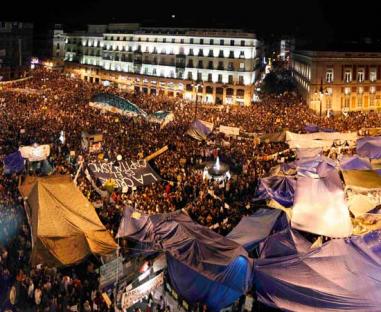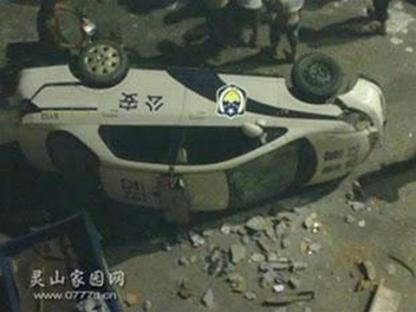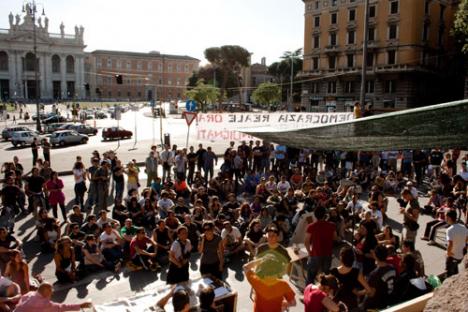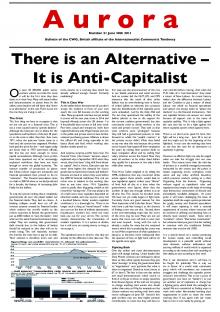You are here
Home ›In UK and elsewhere, global resistance has to be based on working class struggle
“*The crisis is capitalism”
The movement of young Spaniards, the “indignados” (angry ones), started on 15 May (hence the name “15-M”). Its ranks have quickly swelled, attracting tens of thousands of people onto the streets, and even going beyond national borders.
Amongst the various banners in the Puerta del Sol in the centre of Madrid a large black one stood out proclaiming “The crisis is capitalism”. This summed up in a nutshell the common cause behind the various mass movements which have convulsed the world this year. Starting with Tunisia last December, a wave of resistance to the economic and social hopelessness which capitalism has imposed on the young has swept the world. In Spain as in so many of these countries the unemployment of those under 25 is 44%. In Egypt and Tunisia it is worse and even in Italy it is only lower because of the massive amount of casual, part-time temporary workers (the “precari”).
This is not a situation which has arisen suddenly. The young unemployed have been told for years that they need to get educated to get a job but now they have the highest qualifications no-one will employ them at the level to which they trained. From Morocco to Madrid the response has brought thousands onto the streets. Algeria, Egypt, Syria, Libya, Yemen, Bahrain have all seen demonstrations and strikes, with little ripples elsewhere in the Middle East. But the “Arab spring” has turned into a warm European summer since May 15 with the indignados in Spain being copied by a similar movement in Italy (“Italian Revolution – Real Democracy Now”). These mobilisations have been largely spontaneous and built through word of mouth and social networking pages rather than through party manifestos.
At the same time the struggle in Greece looks like becoming really serious now that the Parliament is on its way to passing the new austerity measures demanded by the IMF and EU. Not only did 50,000 occupy Syntagma Square in Athens last week calling for resistance to the cuts but workers in the Greek power industry are now starting a rolling 48 hour strike programme set to last until June 28 (when the final vote on the austerity package takes place). This may not amount to much but it is a step forward from all the separate one day strikes of last year which were largely ineffectual. 10 power plants have already closed and power cuts are forecast. With such resistance it is no wonder that the capitalist class are now talking of a Greek default. If the workers don’t give in the Greek ruling class will be left with no other option (a “managed default” is already being prepared although it won’t be called that). But that’s their problem not ours. Either way the workers will be under attack. At least in struggling they are beginning to find a collective class response which can prepare the way for a real alternative vision of the kind of world we want to live in.
Chinese migrant workers struggle
Meanwhile in the new “workshop of the world” all is not rosy for capitalist exploiters. The last two years have seen massive waves of strikes in different factories and industries as Chinese workers have begun to resist producing huge profits for starvation wages. As Rahul Jacobs reported in the Financial Times
Numbers associated with China are usually big. Even so, a Beijing academic’s recent estimate of the number of “incidents” – an official euphemism for strikes, protests and riots – at 180,000 last year, double the number five years ago, is huge. It works out at 493 a day.
That might seem implausibly high even for a country of more than 1bn citizens, but not in the past few days.
In the southern town of Zengcheng, usually better known for its production of blue jeans, migrant workers rioted over the weekend after security staff manhandled a pregnant 20-year-old street hawker. On Monday the focus was in the eastern city of Yangxunqiao, where workers seeking compensation for lead poisoning were prevented by riot police from boarding buses to go and petition higher authorities. In the central province of Hubei last week protesters pelted police with eggs and bottles after the death in custody of a popular anti-corruption official.
Responding to a wave of strikes in southern China last year, Beijing said it intended to double the minimum wage over the next five years. Buying off strikers is child’s play, however, compared with dealing with ever larger numbers of people who believe Chinese society to be manifestly unjust.
With inflation rising rapidly the take home pay of workers is falling hence the number of strikes. However the situation is worse than that. Chinese migrant workers who are the backbone of production in China’s five coastal provinces, which make up its manufacturing heartland, clashed with police for three consecutive nights this month outside the southern city of Guangzhou. According to the BBC, about 1,000 protesters set fire to cars and damaged government buildings near the city. Police reportedly fired tear gas and deployed armoured vehicles. The protests were said to have begun over the alleged mistreatment of a pregnant migrant worker by security guards. Bricks and bottles were thrown at police, windows were smashed, and police vehicles were overturned. At least 25 people have been arrested but the state is not having much luck getting information. It is now dangling the bribe of a residency permit or hukuo (without which migrants cannot get health or welfare assistance) plus a $1545 reward for information leading to the arrest of those who took part. For years the Chinese Communist Party has been trying to deal with these strikes and riots as “local issues” by sacking corrupt CP officials or sending in the Army. The current scale of them however, and the fact that some workers (such as those at Honda last year – see “Chinese Workers Show their Class” in Revolutionary Perspectives 54) are beginning to link in struggle, make this an increasingly difficult act to maintain. With growth in China slowing and they may have less room for manoeuvre in the future …
Capitalist Counter-attack
We don’t want to exaggerate what is currently going on. There are huge problems in front of a global revival of working class consciousness. The first is that the ruling class will not give in quietly. Spanish and Greek youth have already had a taste of police violence in clearing the squares of peaceful occupations. In the Arab world real repression is already the order of the day. Tunisian youth still face state attacks for demanding that the system gets rid of all those identified with the old regime and for real reform. In Egypt the military junta who took over after Mubarak fell banned strikes as their very first act. In Bahrain those doctors who gave medical assistance to the protestors who were shot by the state have been arrested and tortured into confessing they used arms in the previous demonstrations. In Syria children have been tortured and killed for scrawling anti-regime graffiti. In all these cases our media is largely silent because behind these regimes stands their imperialist interests. Libya can be bombed “to protect civilians” as the great powers jostle for control of its oil but Syria, which is of little interest as it is not a big oil producer, is left to massacre its citizens, burn its villages with hardly a voice raised in criticism. And no one should talk about a trusted ally of the West as in Bahrain … Even in Yemen the Saleh regime continues to get support as the Western power fear the consequences for their interests should he fall.
In the Arab world a further issue is that the myth that the coming of “democracy” will bring jobs is widely believed. They have concluded that the wealth of the West must be based on having an open society without corruption (they have not heard of MPs’ expense scandals etc). What they don’t see is that the wealth of the West is a result of an historic accident - it being the place where capitalism originated. The financial institutions of the West still control the bulk of the world’s trade and as such today redirect its revenues to the rich G8 countries. This is why the banks had to be bailed out. Western wealth has got nothing to do with “democracy” which has been adopted as the best means for capitalist rule in its own heartlands.
Democratic Myths
Indeed the myth of democracy is a far more potent weapon to preserve capitalism than all the forces of repression put together. The idea that by letting us vote for a [limited] number of capitalist parties once every 4 or so years means that we have some say in how capitalism works is a powerful one. It makes capitalism seem the best of all possible worlds. But a new insidious version of democratic capitalism can also be found in the current movements is Europe. In Spain and Italy the spontaneous movements to occupy the city squares were started by those who refused to accept unemployment and the capitalist crisis. At the start widespread discussions were the order of the day but very quickly these movements came to be dominated by a minority around the ATTAC group (of French origin) which campaigns for reforms of international capitalism (such as a tax on banks) under the guise of the slogan “Real Democracy Now!”. They are against “globalisation” (i.e. big capital) but not against the capitalist system as such. This group have tried to steer debate away from the question of the capitalist crisis to the question of the reform of “democracy” to make it more “equal” or “fair”. In fact the issue is the other way round. Without social equality no real “democracy” is possible. In a society of billionaires who control the mass media (and we are not just talking about the Berlusconis and the Murdochs) some “citizens” are “more equal than others” (Orwell). It was thus with some pleasure that we received the document of the Rome Labour Commission of the movement “Italian Revolution – Real Democracy Now” which also saw that the only real way forward to a real democracy was through the overthrow of the capitalist system by the exploited. They thus called for the real movement for “democracy” to be centred on the working class.
As the Labour Commission of the Roman movement of the Italian Revolution we identify the crisis as the motor force of the movement of Spanish indignados and other European countries. This is demonstrated by the attacks on the living and working conditions of the working class carried out by governments of all shades, from Berlusconi to Zapatero. We therefore believe that the question of labour should be placed at the centre of the debate in the movement both in terms of analysis and action, because we think that without the expansion of the movement to all the exploited who pay for the crisis of the capitalist system of production the movement will have no real impact on society [our emphases].
And without the exploited withdrawing their labour to paralyse the system the movement on the streets will be powerless. It was noticeable that in Egypt the Army only got rid of Mubarak not because 800 people had died but because the Egyptian workers had finally decided to strike for their own demands. Only a threat to their property and the legal system which controls it will move the capitalist class.
And “labour” has to be at the heart of any real democracy because only the working class has the ability to get rid of exploitation and class society. This is the premise on which a real anti-capitalist movement will have to be built. There is a precedent. Real workers’ democracy arose out of the strikes in Russia in 1905 when workers sent delegates to a central body to coordinate their actions better. This came to be known as the workers’ council or “soviet”. This was a historical discovery and showed that workers could organise and run a mass society themselves. It was also a more direct democracy since it was made up delegates who could be recalled immediately. They did not elect someone who could do what they liked for 4 or 5 years. There was no specialist class of politicians. In 1917 they revived again and were at first the basis of a promising new society until other factors (not least the isolation of the Russian working class) led to their demise when they became adjuncts of a one party state. This does not diminish their original inspiration and any working class movement will have to base itself on that experience. As the current capitalist crisis is global, as the programmes of austerity become more savage the world working class will be called upon to rediscover not only its capacity for collective struggle, its consciousness of a better alternative but also the gains it made in the past.
Aurora (en)
Aurora is the broadsheet of the ICT for the interventions amongst the working class. It is published and distributed in several countries and languages. So far it has been distributed in UK, France, Italy, Canada, USA, Colombia.
Aurora #2011-06-30
Start here...
- Navigating the Basics
- Platform
- For Communism
- Introduction to Our History
- CWO Social Media
- IWG Social Media
- Klasbatalo Social Media
- Italian Communist Left
- Russian Communist Left
The Internationalist Communist Tendency consists of (unsurprisingly!) not-for-profit organisations. We have no so-called “professional revolutionaries”, nor paid officials. Our sole funding comes from the subscriptions and donations of members and supporters. Anyone wishing to donate can now do so safely using the Paypal buttons below.
ICT publications are not copyrighted and we only ask that those who reproduce them acknowledge the original source (author and website leftcom.org). Purchasing any of the publications listed (see catalogue) can be done in two ways:
- By emailing us at uk@leftcom.org, us@leftcom.org or ca@leftcom.org and asking for our banking details
- By donating the cost of the publications required via Paypal using the “Donate” buttons
- By cheque made out to "Prometheus Publications" and sending it to the following address: CWO, BM CWO, London, WC1N 3XX
The CWO also offers subscriptions to Revolutionary Perspectives (3 issues) and Aurora (at least 4 issues):
- UK £15 (€18)
- Europe £20 (€24)
- World £25 (€30, $30)
Take out a supporter’s sub by adding £10 (€12) to each sum. This will give you priority mailings of Aurora and other free pamphlets as they are produced.
ICT sections
Basics
- Bourgeois revolution
- Competition and monopoly
- Core and peripheral countries
- Crisis
- Decadence
- Democracy and dictatorship
- Exploitation and accumulation
- Factory and territory groups
- Financialization
- Globalization
- Historical materialism
- Imperialism
- Our Intervention
- Party and class
- Proletarian revolution
- Seigniorage
- Social classes
- Socialism and communism
- State
- State capitalism
- War economics
Facts
- Activities
- Arms
- Automotive industry
- Books, art and culture
- Commerce
- Communications
- Conflicts
- Contracts and wages
- Corporate trends
- Criminal activities
- Disasters
- Discriminations
- Discussions
- Drugs and dependencies
- Economic policies
- Education and youth
- Elections and polls
- Energy, oil and fuels
- Environment and resources
- Financial market
- Food
- Health and social assistance
- Housing
- Information and media
- International relations
- Law
- Migrations
- Pensions and benefits
- Philosophy and religion
- Repression and control
- Science and technics
- Social unrest
- Terrorist outrages
- Transports
- Unemployment and precarity
- Workers' conditions and struggles
History
- 01. Prehistory
- 02. Ancient History
- 03. Middle Ages
- 04. Modern History
- 1800: Industrial Revolution
- 1900s
- 1910s
- 1911-12: Turko-Italian War for Libya
- 1912: Intransigent Revolutionary Fraction of the PSI
- 1912: Republic of China
- 1913: Fordism (assembly line)
- 1914-18: World War I
- 1917: Russian Revolution
- 1918: Abstentionist Communist Fraction of the PSI
- 1918: German Revolution
- 1919-20: Biennio Rosso in Italy
- 1919-43: Third International
- 1919: Hungarian Revolution
- 1930s
- 1931: Japan occupies Manchuria
- 1933-43: New Deal
- 1933-45: Nazism
- 1934: Long March of Chinese communists
- 1934: Miners' uprising in Asturias
- 1934: Workers' uprising in "Red Vienna"
- 1935-36: Italian Army Invades Ethiopia
- 1936-38: Great Purge
- 1936-39: Spanish Civil War
- 1937: International Bureau of Fractions of the Communist Left
- 1938: Fourth International
- 1940s
- 1960s
- 1980s
- 1979-89: Soviet war in Afghanistan
- 1980-88: Iran-Iraq War
- 1982: First Lebanon War
- 1982: Sabra and Chatila
- 1986: Chernobyl disaster
- 1987-93: First Intifada
- 1989: Fall of the Berlin Wall
- 1979-90: Thatcher Government
- 1980: Strikes in Poland
- 1982: Falklands War
- 1983: Foundation of IBRP
- 1984-85: UK Miners' Strike
- 1987: Perestroika
- 1989: Tiananmen Square Protests
- 1990s
- 1991: Breakup of Yugoslavia
- 1991: Dissolution of Soviet Union
- 1991: First Gulf War
- 1992-95: UN intervention in Somalia
- 1994-96: First Chechen War
- 1994: Genocide in Rwanda
- 1999-2000: Second Chechen War
- 1999: Introduction of euro
- 1999: Kosovo War
- 1999: WTO conference in Seattle
- 1995: NATO Bombing in Bosnia
- 2000s
- 2000: Second intifada
- 2001: September 11 attacks
- 2001: Piqueteros Movement in Argentina
- 2001: War in Afghanistan
- 2001: G8 Summit in Genoa
- 2003: Second Gulf War
- 2004: Asian Tsunami
- 2004: Madrid train bombings
- 2005: Banlieue riots in France
- 2005: Hurricane Katrina
- 2005: London bombings
- 2006: Comuna de Oaxaca
- 2006: Second Lebanon War
- 2007: Subprime Crisis
- 2008: Onda movement in Italy
- 2008: War in Georgia
- 2008: Riots in Greece
- 2008: Pomigliano Struggle
- 2008: Global Crisis
- 2008: Automotive Crisis
- 2009: Post-election crisis in Iran
- 2009: Israel-Gaza conflict
- 2006: Anti-CPE Movement in France
- 2020s
- 1920s
- 1921-28: New Economic Policy
- 1921: Communist Party of Italy
- 1921: Kronstadt Rebellion
- 1922-45: Fascism
- 1922-52: Stalin is General Secretary of PCUS
- 1925-27: Canton and Shanghai revolt
- 1925: Comitato d'Intesa
- 1926: General strike in Britain
- 1926: Lyons Congress of PCd’I
- 1927: Vienna revolt
- 1928: First five-year plan
- 1928: Left Fraction of the PCd'I
- 1929: Great Depression
- 1950s
- 1970s
- 1969-80: Anni di piombo in Italy
- 1971: End of the Bretton Woods System
- 1971: Microprocessor
- 1973: Pinochet's military junta in Chile
- 1975: Toyotism (just-in-time)
- 1977-81: International Conferences Convoked by PCInt
- 1977: '77 movement
- 1978: Economic Reforms in China
- 1978: Islamic Revolution in Iran
- 1978: South Lebanon conflict
- 2010s
- 2010: Greek debt crisis
- 2011: War in Libya
- 2011: Indignados and Occupy movements
- 2011: Sovereign debt crisis
- 2011: Tsunami and Nuclear Disaster in Japan
- 2011: Uprising in Maghreb
- 2014: Euromaidan
- 2016: Brexit Referendum
- 2017: Catalan Referendum
- 2019: Maquiladoras Struggle
- 2010: Student Protests in UK and Italy
- 2011: War in Syria
- 2013: Black Lives Matter Movement
- 2014: Military Intervention Against ISIS
- 2015: Refugee Crisis
- 2018: Haft Tappeh Struggle
- 2018: Climate Movement
People
- Amadeo Bordiga
- Anton Pannekoek
- Antonio Gramsci
- Arrigo Cervetto
- Bruno Fortichiari
- Bruno Maffi
- Celso Beltrami
- Davide Casartelli
- Errico Malatesta
- Fabio Damen
- Fausto Atti
- Franco Migliaccio
- Franz Mehring
- Friedrich Engels
- Giorgio Paolucci
- Guido Torricelli
- Heinz Langerhans
- Helmut Wagner
- Henryk Grossmann
- Karl Korsch
- Karl Liebknecht
- Karl Marx
- Leon Trotsky
- Lorenzo Procopio
- Mario Acquaviva
- Mauro jr. Stefanini
- Michail Bakunin
- Onorato Damen
- Ottorino Perrone (Vercesi)
- Paul Mattick
- Rosa Luxemburg
- Vladimir Lenin
Politics
- Anarchism
- Anti-Americanism
- Anti-Globalization Movement
- Antifascism and United Front
- Antiracism
- Armed Struggle
- Autonomism and Workerism
- Base Unionism
- Bordigism
- Communist Left Inspired
- Cooperativism and Autogestion
- DeLeonism
- Environmentalism
- Fascism
- Feminism
- German-Dutch Communist Left
- Gramscism
- ICC and French Communist Left
- Islamism
- Italian Communist Left
- Leninism
- Liberism
- Luxemburgism
- Maoism
- Marxism
- National Liberation Movements
- Nationalism
- No War But The Class War
- PCInt-ICT
- Pacifism
- Parliamentary Center-Right
- Parliamentary Left and Reformism
- Peasant movement
- Revolutionary Unionism
- Russian Communist Left
- Situationism
- Stalinism
- Statism and Keynesism
- Student Movement
- Titoism
- Trotskyism
- Unionism
Regions
User login

This work is licensed under a Creative Commons Attribution 3.0 Unported License.





Comments
Problem for the bourgeoise globally is that it simply can't afford capitalist democracy. In the so called under developed regions the capitalist class is tied into the global capitalis market and is to weak to be able to buy of it's working class with a series of welfare reforms. In the developed world the attacks on welfare provision is relentlessly driving on and even the right to protest is becoming increasingly restricted to formal voting rather than effective forms of direct action solidarity strikes. So while ideologically the current struggles metioned in the article are infused with democratic slogans the inabilty of the bourgeosie to deliver reforms will hopefully have less a hold over workers than iit may have had in the past.
One other point missed out of the article was the necessity of a revolutionary party to combat not only the bourgeoise but also the petite bourgeoise radicals of the ATTAC movement. The reason why these radicals are able to exert an influence is the weakness of marxist ideas or more precisely communist left ideas. While we need to recognise the weakness of our ideas within the working class we need to be able to reach out whenever possible and try to make organisational contact with young and not so young militants. Lets not forget that for the majority of it's life the Bolshevik party was a minority in the Russian working class but because organisationally the party knew how to intervene in workers struggle it was able to win the confidence and leadership of the working class to ensure the success of the October revolution.
The point is that we should see in this movement, since it's democratic structure, a more dynamic situation. It can easily evolve in to a class movement if the working class starts organizing itself independently through it, out of the unions and the so called left parties. Surely this capitalist crisis is giving us an exceptional opportunity, it is now our job to trigger our instruments.
To be able to describe struggles in various parts of Europe, to move on to what sounds like amazing turmoil in China, and to end up relating this to a short summary of what happened in revolutionary Russia, where "real workers democracy" - not the bourgeoisie's phony imitation - was able to flower for a brief but glorious moment, makes for a great article, and is a rallying cry for all. And Karim is right to point out the contribution that the capitalists themselves are making: their magnificent crisis providing opportunities daily. This, connected to Dave's reminder that we need to be thinking about the Proletarian Party, and it's formation...enough said!